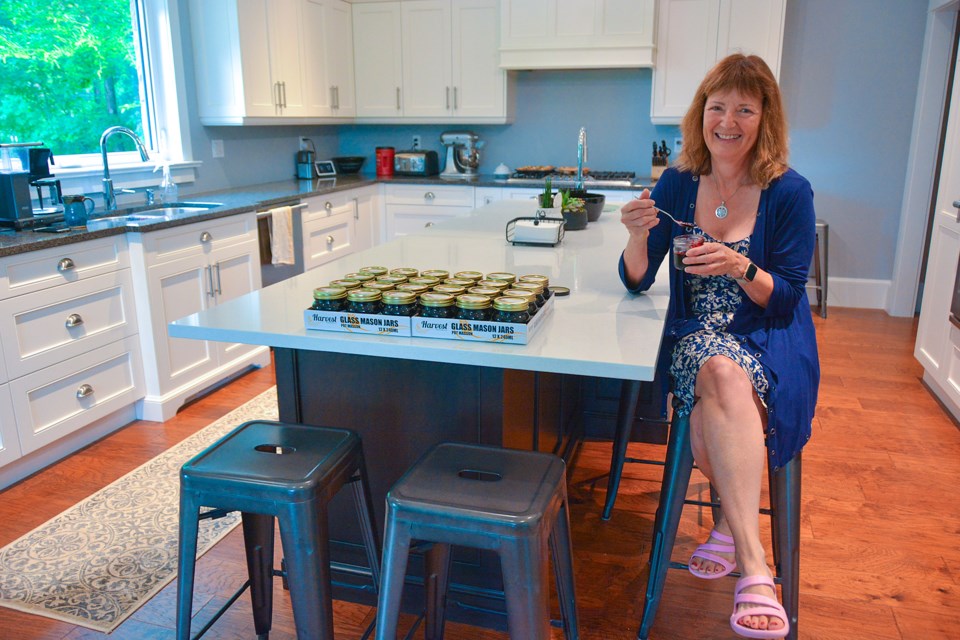It’s an annual labour of love for Bernadette “Bernie” Coyne of Fenwick.
Every summer she fights off wasps and mosquitoes while gathering the black raspberries which grow in the shadow of the majestic black walnut trees on her rural 37-acre property on Cream Street. Five hours a day for three weeks in July, she collects and cooks up the berries in batches, creating a delicious jam.
Aside from a keeping a few jars for family and friends, she donates the balance of her jam supply to Pelham Cares, where it sells for $6 a jar. All of the profit goes to Pelham Cares, as Coyne absorbs the cost of all the materials.
“For those three weeks, my life is pretty much on hold,” Coyne said with a laugh. “I did 216 jars this year, and the 2023 crop is the best year I've ever had. The size of the berry crop varies, year to year. Last year I gave Pelham Cares $300 and something like $560 the year before that. This year I'm hoping to raise $800 through my jam sales.”
Her recipe is simple: sugar, pectin (a starch which is an essential ingredient in preserves, causing them to gel into a semi-solid texture when they cool after cooking), and black raspberries. That’s it.
Coyne, a nurse and dental hygienist married to a dentist, is one of nine children born to Dutch parents. She and her husband met while picking fruit as teenagers on a farm in Niagara-on-the-Lake. They built their dream home in 2015, but didn’t move in until 2017.
“I started just walking along the perimeter of the property, and noticed the black raspberries,” she said. “As time passed, I started going deeper into the woods, and discovered more berries. We have about 10 acres of black walnut trees, and underneath the black walnuts are all these wild black raspberries. I wear jeans and a mosquito jacket for protection from the bugs, and wear surgical gloves to protect my hands from getting stained by the berries, and cut by the thorns on the bushes. I also wear boots, because it can get pretty marshy when we’ve had a lot of rain. Some of the crop is eaten by deer and birds, but I manage to harvest most of it.”
Black raspberries, botanically classified as Rubus occidentalis, are a rare raspberry species belonging to the Rosaceae family.
They are native to North America, and grow wild on deciduous shrubs reaching two to three metres in height. Black raspberries are distinct from blackberries, and are a separate species with a unique flavor, texture, and appearance. Black raspberries have a complex, sweet-tart flavor, which Coyne described as a “flavour explosion in your mouth.” In addition to being prepared as a jam, they can also be served with cream as a dessert, tossed into salads, mixed into fruit bowls, stirred into parfaits and smoothies, and displayed on cheese boards to showcase their coloring. Black raspberries pair well with nuts such as almonds, walnuts, and pecans, other fruits, and chocolate. Whole, unwashed Black raspberries will keep two to three days when stored in a ventilated container in the refrigerator.
Coyne’s land includes the original Comfort Family homestead, which they rent out as an income property.
“The house was built after the War of 1812, deeded to Laura Secord’s brother-in-law, Captain Secord, who received it as part of a land grant for service to the British Crown during the war,” said Coyne. “The Comfort family bought it in 1816, and owned the property until 1985. We bought it in a bankruptcy sale.”
Harvesting her black raspberries, using a six-quart wooden basket with a shoulder strap, is a solitary activity for Coyne, who undertakes it in the spirit of community service.
“I just feel so blessed to have lived here in Pelham since 1981,” she said. “The way I view it, I'm taking from the land and giving back to its people.”



